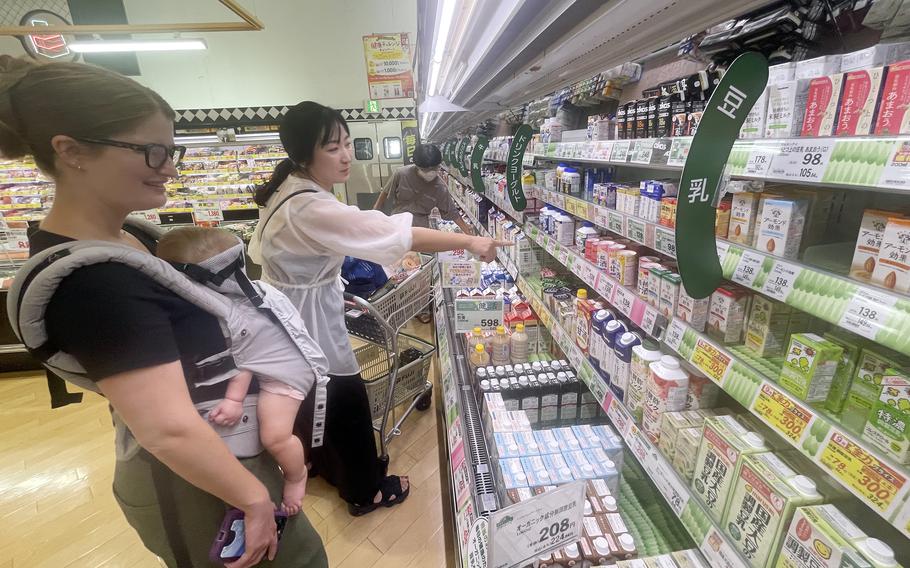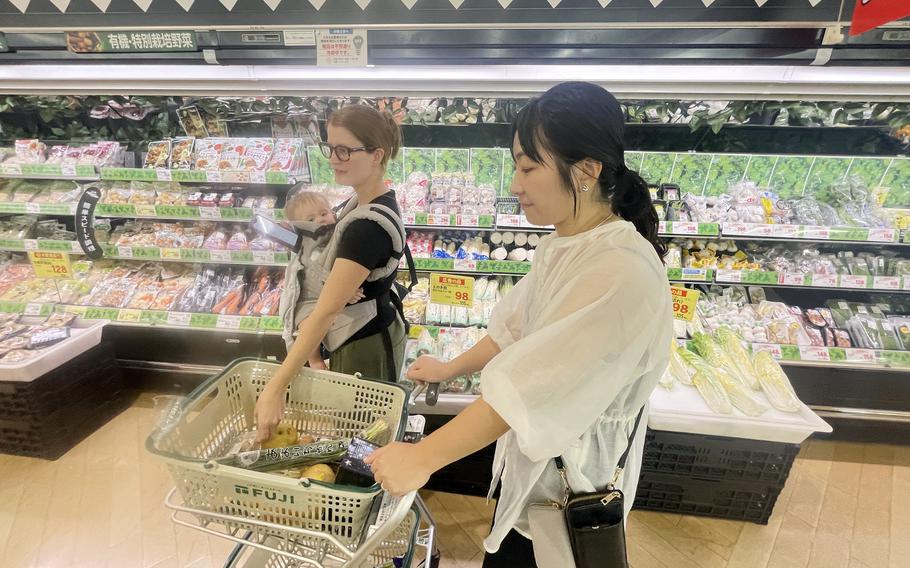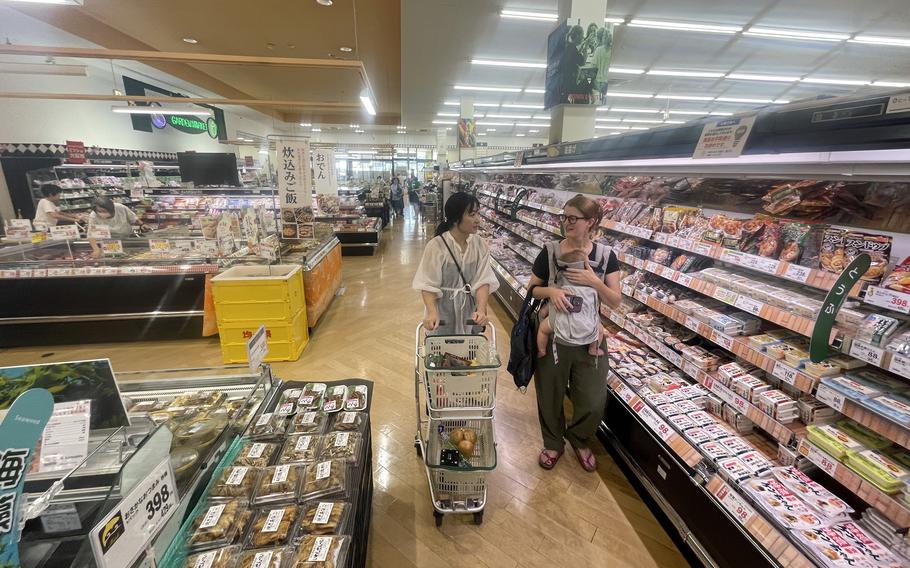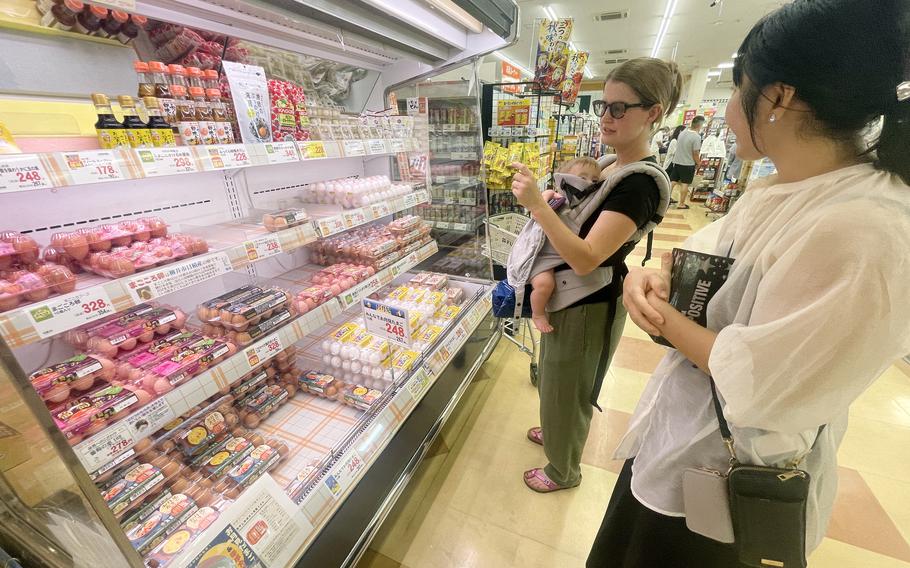
Akemi Kikugawa of the Japanese American Society helps Marine Corps spouse Camille Williamson shop at a Japanese grocery store near Marine Corps Air Station Iwakuni, Japan, Sept. 17, 2024. (Jonathan Snyder/Stars and Stripes)
MARINE CORPS AIR STATION IWAKUNI, Japan — A group of nearly 20 Americans and Japanese teamed up here recently for a discovery expedition into the aisles of a Japanese supermarket.
Marine spouse Camille Williamson, paired with local resident Akemi Kikugawa, said the trip to an off-base grocery story made her a savvier and more confident shopper.
“I have some food allergies and so trying to figure out how to navigate that is a bit more difficult when you can’t read the package labels,” Williamson said Sept. 17 at an Iwakuni city Fuji Mart. “That’s probably relevant to a lot of people, so it’s nice to be able to talk with somebody who can speak the language and help navigate that.”
The Japanese American Society, a private organization at this base south of Hiroshima, arranges the trips to help military families navigate the challenges of shopping on the local economy.
Shopping off base is a great idea, because fresh produce and other unique ingredients are more readily available and affordable, said Katsue Ogata, the society’s membership committee co-chair.
“SOFA [members] have a fantastic opportunity to team up with Japanese locals to learn about local products, including trying delicious new foods,” she said during an interview Sept. 13.
Off-base shopping can be intimidating for some Americans stationed in Japan.

Akemi Kikugawa of the Japanese American Society helps Marine Corps spouse Camille Williamson shop at a Japanese grocery store near Marine Corps Air Station Iwakuni, Japan, Sept. 17, 2024. (Jonathan Snyder/Stars and Stripes)
“We’ve only lived here for a short time and I’m nervous to go off base because of the language barrier,” Marine spouse Haylee Clark said Sept. 13 at the MCAS Iwakuni commissary.
With the yen valued at a record low this year, some Americans are taking advantage of their purchasing power by shopping in local stores. When Navy spouse Stephanie Drury arrived here in April, she was thrilled about the opportunity.
“I was excited to shop off base, but I didn’t know where to start,” she said Sept. 16 at Torii Pines Cafe. “I kept joking I’m going to buy flour but end up with sugar or something else instead.”
During a grocery tour in May, Drury’s Japanese guides showed her their favorite tofu, soy sauce and salad dressing.
“I think I’m saving a lot of money every time I check out and I’m happy to see how little I spent,” she said.
A shopping basket with milk, eggs, bread and bananas at the MCAS Iwakuni commissary was 22% more expensive than the same items at Fuji Mart, according to an informal survey Monday by Stars and Stripes.
Few food brands in the commissary overlap with items sold in local stores, so Drury still shops for some items on base.

Akemi Kikugawa of the Japanese American Society helps Marine Corps spouse Camille Williamson shop at a Japanese grocery store near Marine Corps Air Station Iwakuni, Japan, Sept. 17, 2024. (Jonathan Snyder/Stars and Stripes)
The guided shopping tour has been an annual event for more than a decade, Navy spouse Maggie Wu, a friendship society membership committee co-chair, said Sept. 13 at the base’s Community Support Center.
“We noticed that a lot of SOFA members want more than just one time,” she said. “So, we are thinking maybe next year, doing it twice.”
While some U.S. military families are primarily buying fresh produce in Japanese supermarkets, they still shop at the commissary for familiar items and for convenience.
“I prefer to shop off base for produce,” Jasmine Herion, spouse of a Department of Defense contractor, said at the commissary Sept. 13. “It’s cheaper, fresher and more variety.”
The number of customer transactions at commissaries in Japan has remained steady from October 2022 through August, although less items are being purchased, Defense Commissary Agency spokesman Keith Desbois said by email Sept. 24.
“DOD’s investment to DeCA’s operating budget allows commissaries to deliver a goal of 25 percent overall savings against local market baskets outside the gate, if our patrons shop their commissary regularly,” he said.

Akemi Kikugawa of the Japanese American Society helps Marine Corps spouse Camille Williamson shop at a Japanese grocery store near Marine Corps Air Station Iwakuni, Japan, Sept. 17, 2024. (Jonathan Snyder/Stars and Stripes)